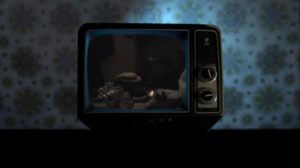You have no items in your cart. Want to get some nice things?
Go shopping You stare at the screen but you don’t see anything, not really. You have been in this place for an hour; you will be here for seven more, eight if you include lunch.
You stare at the screen but you don’t see anything, not really. You have been in this place for an hour; you will be here for seven more, eight if you include lunch.
The screen you are sitting in front of is broken into modules of varying degrees of interest. A carpet of icons like pennies lost on the street, each one offers you a fresh new perspective. Anyone can speak to you. Anyone can see you. You can see anything you want. You click a button to flip between alternative blanknesses.
Information is stacked obsessively. When you pull a thread it all slips out; pain and shame and displaced responsibility. A lot has happened since you last pulled this thread, but not a lot of time. You pull it again now, and you find familiar grief. You follow the threat forward again to catch up. You feel something, maybe, but you don’t know what.
Your phone lights up and tiny letters spell out disaster. The letters are neatly packaged in a little rectangle; you can view more or dismiss it and clear the screen. You do neither. The light goes out and you look back to your bigger screen, watching as pockets of it reload to show fresh takes that tug at your heart and your head for the right reaction, the required opinion. You can tell by their tones that your colleagues are talking about it. They are frightened but there’s something else; they are proud custodians of information. Nobody gets to break the news anymore, so why does everybody still try?
*
Your mum phones and for once you pick up. “Yes, I’m fine … no, it wasn’t really that close … yes, I’m still at work … no, it’s probably safer here, there’s police everywhere … lightning doesn’t strike twice…”
*
You go to the pub after work and your friends say things like, “I read that—” or “So-and-so said—”. You get your glasses refilled and you forget.
*
You lie on your side in the dark, illuminated by the screen. Frozen, except for the flicking of your thumb. The phone’s glow is warmer now, so you can look at it in the dark without interrupting your sleep. You don’t think about the irony.
You can donate to charities that help the victims’ families, charities that lobby for change, research organisations, independent education providers. If you tweet a certain hashtag, some corporation that you know is awful but you don’t know why will make a donation in your name. There are already t-shirts available for every opinion that isn’t quite formed yet. Some of the posts don’t mention the disaster, and you wonder if those people don’t know yet or if they really are that callous. You see an advert for something you want. Out of respect for the dead, you don’t click it; you make a mental note to Google it tomorrow instead.
You put the phone down on the floor. You pick it back up, put it on vibrate. If anything else should happen, you want to be alerted, but only if you’re already awake enough to hear the phone rattle against the floor.
You lie in the dark until you think you’re not going to fall asleep tonight. You think about the disaster a little. You imagine someone you know being caught up in it; your mum perhaps, or maybe your partner. Would you have the right reaction then?
*
You expect something else when you get to work the next day; police or a bag check, a family day or a day of mourning. You expect everything to feel different, but it doesn’t. There is traffic and clusters of children on their way to school, waves of music as cars pass by, small talk. Life goes on, but does it have to be so soon?
*
Nobody at work knows anybody who was there, but everybody knows somebody who does … who did. There’s a thick, sickening excitement; existential rubbernecking. Everyone is thinking that it could have been us, that we deserve to know more, to see more, to feel more.
Somebody calls a meeting, but it isn’t about the disaster; it’s about a project you’re not working on. Back at your desk you hear laughter from the meeting room.
Opinions are waiting for you on the screen. They have landed overnight like UFOs. Bolder friends share them publicly and you think their commitment is premature. You read three opinion pieces on your lunch break. You agree with parts of each. They are all conflicting. As if it wasn’t enough that you don’t know to feel, you have just realised that you don’t know how to think for yourself either. You realise this every time and then you forget.
Somebody has started a collection, there’s an email thread that’s already thirty-two replies deep. You commit to a small donation, picking an amount based on what your co-workers have already donated. You don’t know the price of compassion, but you’re pretty sure it’s relative.
*
In your evening class, the instructor suggests you use your art to channel the pain and you think: if only it were that simple. Are you unsympathetic or just untalented?
In spite of everything, you take the busiest route home. For so many reasons, you can’t afford to be alone in the dark right now.
*
Your partner asks you what’s wrong and you say you’re just shaken up, you know, after all that’s happened. Your partner nods considerately and folds you into their arms. They are a good partner. They tell you that they will protect you. They say, “Not that you need protecting.” They say, “You know what I mean.”
You spray bleach around the grimy rim of the bathtub and watch as the satisfying green splatters drip down the white plastic. You scrub and rinse and fill the bath with hot water. You don’t add any bubbles or oil today, it doesn’t feel appropriate.
You let the water scald you as you crouch. You pull your knees to your nose and for a while you just sit there, holding yourself. Eventually, you lie back, slide your head into the water, listen to the noise inside your head, hoping it’ll all start to make sense. It doesn’t, of course. It just sounds like mush.
*
You mum texts you all the time now. You learn that you can make it stop by saying you’re at home, as if nothing bad could possibly happen there.
You go to the gym. The screen in front of the only free spinning bike is playing the news. It’s only just turned six; you will have to watch the news for your entire workout. You consider going home but you’re ashamed, your gym clothes already seem to be mocking you.
You adjust the bike, straddle it, start to move your legs in circles. Your thighs bob up and down, up and down. They’re showing footage of it on the news, of the aftermath; women crying with blood in their eyes, children practically naked in newly torn rags. They cut out the goriest stuff as a gesture of respect, but you suppose they don’t think much about emotionally graphic content; or more likely, they think too much of it.
They have some suspects now and they show blurry CCTV footage that could be anyone or no one. The footage reminds you of the clips your little sister watches on YouTube with titles like “REAL LIVE GHOST!!!!” and “omg look what i just saw in my dads basement”.
After half an hour, you slow your pedalling, you flex your ankles up and down. With a big smile the woman newscaster, twenty years younger than her male counterpart, switches to the soft news; a film premiere, a gentle animal-rights stunt, a deep-fried mouse in a box of brand-name frozen chicken nuggets.
You decide that life’s too short to shower at the gym, and then you think of what could happen on your way home. You shower at the gym. You think it could be your last.
*
Nobody mentions it in the office on Friday. You only see one new opinion piece. You don’t read it. Everybody is posting about different things again – their jobs, their dogs, their weekend plans, their voice-of-a-generation hot takes. You send some emails. You talk about a new project with your boss. You go outside to eat lunch, which you haven’t done for three days … just in case.
The park is radiant with fat and low autumn sun. The trees form a traffic light constellation lining the path. You choose a green one to sit beneath. Taking shelter in its luscious canopy, you can’t help but think how these leaves will dry out soon, death by dehydration, rotten long before they are scraped up and burned and fed to the same sky they spent their lives reaching for. You think you know how they feel.
You eat pasta and pesto from an old takeaway container with your fingers; you have forgotten to bring a fork. An old man walks past as you have your forefinger and thumb pinched together in your mouth. You look to be giving a silent, slobbish wolf whistle. You stare at him and he pretends not to see. A dog lifts its leg by the bench and you shout “NO!” You pretend not to see the walker scowling at you as she passes. You think all there is in life are moments of not seeing and of not being seen. You think that how you experience the world is just a case of when you choose to look and when you choose to look away.
You try to listen to the sounds of the city: the birds in the park, the cars on the road, the wind in the trees, sirens in the distance. You spend a good amount of time sucking pesto off your fingers and then wiping your fingers on your jeans.
You pull out your phone to check the time. You should probably be back at work soon. You have a lot of notifications: your mum, your partner, your boss. The sirens are louder now.

About Kylie Whitehead
Kylie Whitehead is a writer from Bristol, UK. Her short fiction explores themes of ordinary loneliness in extraordinary situations.
- Web |
- More Posts(1)



